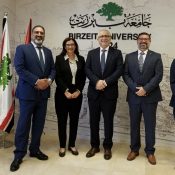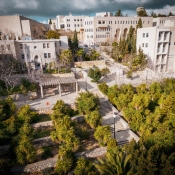Birzeit University Museum opens and discusses Reem Masri's "Occupied Land, Occupied Body"
As part of their Hakawi program, Birzeit University Museum held a conversation between Reem Masri, visual artist and instructor in the Faculty of Art, Music and Design, and Dr. Rana Barakat, director of the Birzeit University Museum and associate professor in Faculty of Arts on Wednesday, May 17, 2023.
Titled “Landscape Bodily Imaginations: Reem Masri’s Occupied Land, Occupied Body,” the conversation was framed by the collective exploration of the re/presentations of landscape and the body in Masri’s work.
After welcoming the attendees, Dr. Barakat thanked Masri for sharing her intimate journey through her artwork, which serves as an open invitation to the museum visitors to learn how personal experiences can become part of collective narratives.
As described by the museum’s conceptual description of the installation, “Masri blurs the boundaries between the body and the land to explore their relationship with the memory and identity in an attempt to blend the personal with the collective.”
Masri explained, “When I was studying in France, I discovered that I have cancer. I returned to Palestine to find out the treatment is only available in Jerusalem, a place I was banned to visit by the Israeli occupation. After finally getting the chance to go to Jerusalem for chemotherapy, an intimacy was developed between my body, which was occupied by cancer, and the Palestinian landscape ravaged by settler colonialism.”
Masri’s installation features sketches inspired by radiation therapy x-rays and the streets she walked through on her way to the hospital in occupied Jerusalem. In juxtaposition with the Apartheid Wall, which constricted her and all Palestinians’ movement as one tool of many in the settler colonial landscapes of occupied Palestine, Masri choose plastic slides as a light and transparent medium that represents her newfound ability to see through and move beyond the wall. As described by Birzeit University Museum, “Masri’s installation defies both temporality and place, as she invites visitors to walk with her and through her as they walk with themselves in their landscapes.”
The haunting and provocative layers of sounds and aesthetics allow visitors to hear a distant chemotherapy timer and see their own shadows reflected on the installation, adding their own experience with their bodies and settler colonialism to her artwork.
The conversation concluded with an open discussion, where Masri engaged with the inquiries of the attendees. The event was attended by university students, professors and many from the general public.












